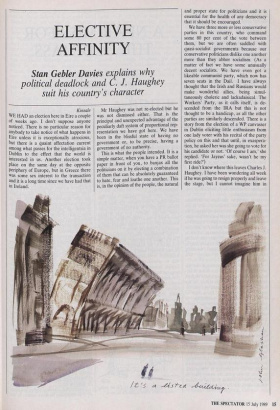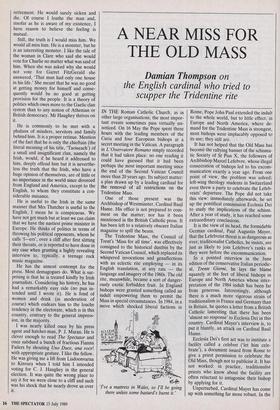ELECTIVE AFFINITY
Stan Gebler Davies explains why political deadlock and C. J. Haughey
suit his country's character
Kinsale WE HAD an election here in Eire a couple of weeks ago. I don't suppose anyone noticed. There is no particular reason for anybody to take notice of what happens in Eire unless it is exceptionally atrocious, but there is a quaint affectation current among what passes for the intelligentsia in Dublin to the effect that the world is interested in us. Another election took place on the same day at the opposite periphery of Europe, but in Greece there was some sex interest to the transaction and it is a long time since we have had that in Ireland.
Mr Haughey was not re-elected but he was not dismissed either. That is the principal and unexpected advantage of the peculiarly daft system of proportional rep- resentation we have got here. We have been in the blissful state of having no government or, to be precise, having a government of no authority. This is what the people intended. It is a simple matter, when you have a PR ballot paper in front of you, to banjax all the politicians on it by electing a combination of them that can be absolutely guaranteed to hate, fear and loathe one another. This is, in the opinion of the people, the natural and proper state for politicians and it is essential for the health of any democracy that it should be encouraged.
We have three more or less conservative parties in this country, who command some 80 per cent of the vote between them, but we are often saddled with quasi-socialist governments because our conservative politicians dislike one another more than they abhor socialism. (As a matter of fact we have some unusually decent socialists. We have even got a likeable communist party, which now has seven seats in the Dail. I have always thought that the Irish and Russians would make wonderful allies, being simul- taneously choleric and lackadaisical. The Workers' Party, as it calls itself, is de- scended from the IRA but this is not thought to be a handicap, as all the other parties are similarly descended. There is a story from the election of a WP canvasser in Dublin eliciting little enthusiasm from one lady voter with his recital of the party policy on this and that until, in exaspera- tion, he asked her was she going to vote for his candidate or not. 'Of course I am,' she replied. 'For Jayzus' sake, wasn't he my first ride?') I don't know where this leaves Charles J. Haughey. I have been wondering all week if he was going to resign properly and leave the stage, but I cannot imagine him in retirement. He would surely sicken and die. Of course I loathe the man and, insofar as he is aware of my existence, I have reason to believe the feeling is mutual.
Still, the truth is I would miss him. We would all miss him. He is a monster, but he is an interesting monster. I like the tale of the woman in Clare who said she would vote for Charlie no matter what was said of him. When she was asked why she would not vote for Garret FitzGerald she answered, 'That man had only one house in his life.' She meant that he was no good at getting money for himself and conse- quently would be no good at getting provision for the people. It is a theory of politics which owes more to the Gaelic clan system than to any notion of Athenian or British democracy. Mr Haughey thrives on it.
He is commonly to be met with a phalanx of minders, servitors and family behind him. It is a proper retinue. Mention of the fact that he is only the chieftain (the literal meaning of his title, `Taoiseach') of a small and insignificant clan, namely the Irish, would, if he heard it addressed to him, deeply offend him but it is neverthe- less the truth that the Irish, who have a huge opinion of themselves, are of little or no importance in the world since divorced from England and America, except to the English, to whom they constitute a con- siderable nuisance.
He is useful to the Irish in the same manner that Mrs Thatcher is useful to the English, I mean he is conspicuous. We have not got much but at least we can claim that we have the nastiest prime minister in Europe. He thinks of politics in terms of throwing his political opponents, whom he calls `f—ers', over a cliff after first slitting their throats, or is reported to have done in any case when granting a highly revealing interview to, typically, a teenage rock music magazine.
He has the utmost contempt for the press. Most demagogues do. What is sur- prising is that he is treated kindly by Irish journalists. Considering his history, he has had a remarkably easy ride (no pun in- tended until I wrote it). He is fond of women and drink (in moderation of course) which endears him to the louche tendency in the electorate, which is in this country, contrary to the general impress- ion, in the majority.
I was nearly killed once by his press agent and hatchet-man, P. J. Maran. He is clever enough to read The Spectator and once subdued a bunch of fractious Fianna Failers by shouting Uno Duce, una voce! with appropriate gesture. I like the fellow. He was giving me a lift from Lisdoonvarna to Kinvara when I told him I intended voting for C. J. Haughey in the general election. It was quite the wrong place to say it for we were close to a cliff and such was his shock that he nearly drove us over it.



















































 Previous page
Previous page